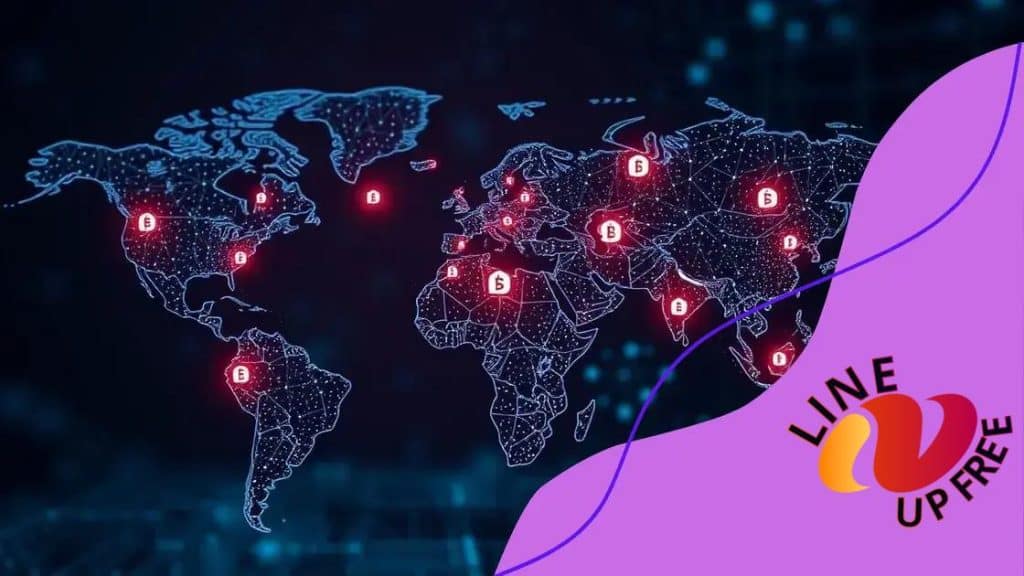The role of blockchain in cross-border financial transactions

Anúncios
The role of blockchain in cross-border financial transactions enhances security, efficiency, and transparency by leveraging decentralized technology to streamline processes, reduce costs, and eliminate intermediaries.
The role of blockchain in cross-border financial transactions has been a game-changer in today’s economy. It addresses inefficiencies, enhances transparency, and reduces costs associated with traditional banking systems. Have you considered how this technology might affect your financial interactions?
Anúncios
Understanding blockchain technology
Understanding blockchain technology is essential for grasping its impact on the financial world. Blockchain is a decentralized, digital ledger that records transactions across many computers. This technology ensures that transactions are secure, transparent, and immutable, meaning they cannot be altered or deleted once added to the chain.
This innovative solution has transformed how we conduct financial transactions. By removing the need for intermediaries like banks, blockchain greatly speeds up processes and reduces costs.
Core Components of Blockchain
To fully appreciate blockchain, it’s vital to understand its core components. These include:
Anúncios
This structure not only enhances security but also improves efficiency. By eliminating third parties, blockchain technology can significantly lower fees associated with international payments.
The Role of Cryptography
Another fascinating aspect of blockchain is its use of cryptography. Transactions are secured through complex algorithms, making it nearly impossible for unauthorized users to alter data. This means that cross-border financial transactions are safer than ever before. Many organizations are now considering blockchain due to these enhanced security measures, leading to a shift in traditional banking methods.
As we continue to evolve in a digital environment, understanding the fundamentals of blockchain technology will become increasingly important. It not only shapes our approach to traditional finance but also paves the way for future innovations.
Benefits of blockchain for international transactions
The benefits of blockchain for international transactions are substantial. This technology offers a new way to process payments across borders quickly and securely. Because of its decentralized nature, transactions happen without the need for intermediaries, reducing the time and cost involved.
One major advantage is speed. Traditional international transfers can take several days. However, with blockchain, transactions can occur in real-time. This improvement is crucial for businesses that rely on fast payments to maintain operations.
Cost Reduction
In addition, using blockchain significantly lowers fees associated with transactions. By eliminating middlemen such as banks or payment processors, companies can save on service charges. When considering international business, these savings can add up, enhancing overall profit margins.
Security is another critical benefit. Blockchain employs advanced cryptographic methods to secure transaction data, making it nearly impossible for fraud to occur. Each transaction is recorded in a secure, time-stamped manner, ensuring transparency and accountability between parties.
Enhanced Transparency
This brings us to the point of transparency. All participants in a transaction can access the same records, which is not the case with traditional systems. This visibility promotes trust between businesses and clients, opening up opportunities for collaboration and reducing disputes.
As more companies adopt blockchain technology, the landscape of international finance will continue to evolve. The shift towards blockchain not only brings operational efficiencies but also creates a more secure and trustworthy payment ecosystem globally.
How blockchain enhances security in finance

How blockchain enhances security in finance is a crucial topic in today’s digital world. The unique features of blockchain technology provide a new level of protection for financial transactions. With decentralization, blockchain eliminates single points of failure that can lead to data breaches and fraud.
Every transaction is verified by multiple nodes in the network, ensuring that no unauthorized changes can occur. This process builds a secure environment where information is shared openly among authorized users. Each record, or block, permanently stores transaction details, which cannot be altered or deleted, providing a high level of accountability.
Key Security Features
Several key features contribute to the enhanced security of blockchain:
This transparency builds trust among users as they can easily trace and prove transactions. Additionally, the time-stamped nature of blockchain ensures that any attempt to manipulate data can be quickly identified.
Applications in Financial Services
In financial services, the application of blockchain can significantly reduce risks. It allows for secure digital identities, preventing identity theft and enhancing KYC (Know Your Customer) processes. Banks and financial institutions are exploring blockchain solutions to improve transaction security and streamline operations.
As more businesses adopt this technology, understanding how blockchain enhances security will be key to leveraging its benefits and staying ahead in the competitive financial landscape.
Challenges in adopting blockchain solutions
Understanding the challenges in adopting blockchain solutions is crucial for businesses considering this technology. While blockchain promises numerous benefits, several hurdles can complicate its implementation. These include technical difficulties, regulatory hurdles, and the need for industry-wide collaboration.
Firstly, many organizations face technical challenges. Integrating blockchain with existing systems can be complex and requires a strong understanding of both new technologies and legacy infrastructure. The training needs for employees can also pose a significant barrier, as workers must learn how to effectively use blockchain technology.
Regulatory Concerns
Another significant challenge is navigating the regulatory landscape. As blockchain technology evolves, so do regulations governing its use. Many countries have yet to establish clear guidelines on how blockchain can be used in financial transactions. This uncertainty can create frustration and hesitation among businesses wanting to invest in this innovation.
The lack of standardized practices across the industry can also slow adoption. Each organization may implement blockchain differently, causing interoperability issues that hinder collaboration and data exchange. Without common standards, the potential benefits of blockchain may remain unrealized.
Resistance to Change
Lastly, there can be a cultural resistance to change within organizations. Stakeholders may be resistant to new technologies, preferring to stick with current methods. This mindset can limit a company’s ability to adapt and innovate in a rapidly changing financial landscape.
Despite these challenges, many businesses are finding ways to overcome them. By understanding the hurdles associated with adopting blockchain, organizations can better prepare themselves to implement this transformative technology effectively.
Future trends in blockchain and finance
The future trends in blockchain and finance suggest a significant transformation in how transactions are conducted globally. As businesses and consumers increasingly recognize the advantages of blockchain, its adoption will likely expand rapidly in the financial sector. This evolving landscape promises enhanced efficiency, transparency, and security.
One major trend is the integration of blockchain with artificial intelligence (AI). By combining these technologies, companies can analyze large volumes of data quickly while maintaining security. AI can help identify patterns in transaction data, leading to better risk management and fraud detection.
Decentralized Finance (DeFi)
Another exciting development is the rise of Decentralized Finance (DeFi). DeFi platforms enable users to lend, borrow, and trade without intermediaries like banks. This trend empowers individuals by providing greater control over their assets and reducing transaction fees. The growth of DeFi could open up new financial opportunities for people worldwide.
Additionally, blockchain technology is expected to improve regulatory compliance. Automated smart contracts can help organizations comply with regulations more efficiently. By programming rules directly into the blockchain, businesses can ensure they meet legal requirements in real-time, reducing the risk of costly fines or penalties.
Increased Interoperability
Finally, increased interoperability between different blockchain networks will become essential. Establishing seamless connections between various blockchain systems will promote collaboration and data sharing, driving innovation in financial services. The goal will be to create an integrated ecosystem where data flows freely, enhancing overall efficiency.
As we look ahead, these trends point toward a future where blockchain plays an integral role in finance, redefining traditional practices and enhancing user experiences.
In conclusion, the future of blockchain in finance looks bright and full of potential. With the integration of emerging technologies like AI, the rise of decentralized finance, and improvements in regulatory compliance, the financial landscape is set to change. Blockchain will enhance security and efficiency, making financial transactions faster and more transparent. As these trends continue to develop, staying informed and adaptable will be key for businesses looking to thrive in this evolving environment.
FAQ – Frequently Asked Questions about Blockchain in Finance
What is blockchain technology?
Blockchain is a decentralized digital ledger that records transactions across multiple computers, ensuring security and transparency.
How does blockchain improve security in finance?
It enhances security by using cryptographic methods, decentralization, and transparency, making fraud difficult.
What is Decentralized Finance (DeFi)?
DeFi refers to financial services that operate without traditional banks, allowing users to lend, borrow, and trade directly with one another.
What challenges do businesses face when adopting blockchain?
Challenges include technical difficulties, regulatory concerns, and resistance to change within organizations.





